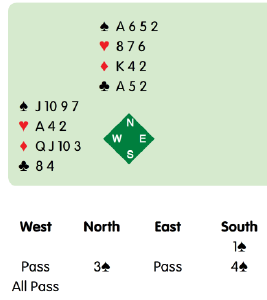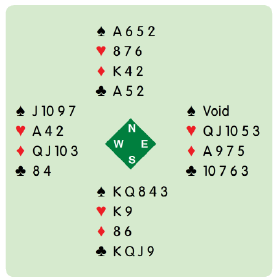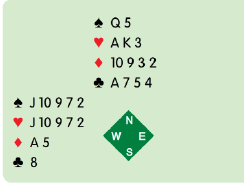Source: www.mrbridge.co.uk ![]()
![]()
![]()
![]()
At matchpoint pairs, it can matter not just whether you defeat the contract but by how much. Consider the following defensive problem as West playing pairs:
 You lead the queen of diamonds, which holds the trick, partner following with the nine. You continue with the jack, holding the trick again, and partner follows with the five. What card do you play now? It is dear that partner holds the ace and therefore his peter has indicated four; you know the next diamond will be ruffed. You can see a sure way of beating this contract by cashing the ace of hearts, so what is the problem? The problem is that it may not be good enough simply to defeat a contract in order to score well at pairs. If this is a normal auction (and we have no reason to believe otherwise – we can see that dummy’s bidding is clear-cut) this is going to be a popular contract and the cards are lying unluckily for declarer. Not only is he about to run into a bad trump break, but the ace of diamonds was wrong and it is possible that hearts also lie poorly for him also. Can it ever cost you to hold on to your ace of hearts for the time being? Declarer has two diamonds and, at most, five trumps. Holding six cards in the other two suits, there is no prospect that any heart tricks will disappear. Therefore, you should continue with a third diamond and await whatever heart tricks are coming to you. This was the full deal:
You lead the queen of diamonds, which holds the trick, partner following with the nine. You continue with the jack, holding the trick again, and partner follows with the five. What card do you play now? It is dear that partner holds the ace and therefore his peter has indicated four; you know the next diamond will be ruffed. You can see a sure way of beating this contract by cashing the ace of hearts, so what is the problem? The problem is that it may not be good enough simply to defeat a contract in order to score well at pairs. If this is a normal auction (and we have no reason to believe otherwise – we can see that dummy’s bidding is clear-cut) this is going to be a popular contract and the cards are lying unluckily for declarer. Not only is he about to run into a bad trump break, but the ace of diamonds was wrong and it is possible that hearts also lie poorly for him also. Can it ever cost you to hold on to your ace of hearts for the time being? Declarer has two diamonds and, at most, five trumps. Holding six cards in the other two suits, there is no prospect that any heart tricks will disappear. Therefore, you should continue with a third diamond and await whatever heart tricks are coming to you. This was the full deal:

You will see that declarer has little option but to try a heart towards the king and, if you have not cashed the ace prematurely, he will have to go two down. Collecting a mere one down will get you a well below average score. This is because the contract is a fair one, needing just one ace onside and trumps no worse than 3-1 and the opponents have game values and a nine-card fit. On the deal above, there was no danger at all in defending for an extra undertrick. Unfortunately, things are not always so simple. Withholding a winner often entails some risk. On the next deal, you elect to lead the jack of spades, having a complete guess between the majors on the auction:


Partner takes the king, cashes the ace, and returns a spade to your hand to cash five rounds of the suit, partner discarding a low club and a low heart. Are you going to lay down your *A? Partner could hold two more points, which could be the •Q, in which case you may remove a guess that declarer had to make for his eighth trick. The danger is that if declarer began with five clubs, he will have eight tricks if you do not cash your ace now. Playing distributional discards, you would know; if not, given the danger and that, at best, you are only giving declarer a guess, you should cash your ace. Here is the full deal:
 In summary, try to be as greedy as you sensibly can at pairs. Do not always cash the contract down if there may be a way to get an extra trick.
In summary, try to be as greedy as you sensibly can at pairs. Do not always cash the contract down if there may be a way to get an extra trick.
